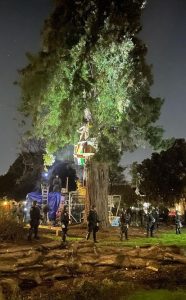Early last month, People’s Park, the heart of Berkeley’s counterculture movement, became an epicenter of heated confrontations between police forces and activists.
On Jan. 4, in a midnight mission, hundreds of officers overtook the historic park in an effort to clear out activists and unhoused campers and make way for UC Berkeley’s ambitious plan to construct student housing on the city block east of Telegraph Avenue.
Individuals committed to saving the park expressed outrage about the action.
“This is fully illegal,” said Rico Marisol, a UC Berkeley graduate who worked in the park’s makeshift kitchen serving food to those in need.
“If anybody else did this, they would be getting in trouble, but it’s the university, so f— the laws,” she said.
The closure of People’s Park stands as a symbol of the ongoing struggle between university development plans and the preservation of cultural and historical landmarks.
The $312 million project has faced repeated delays and legal challenges, leading to the late-night showdown that left the city’s iconic park surrounded by shipping containers and law enforcement.
The action by law enforcement on Jan 4. led to nearly a dozen arrests of locals and activists.
 The controversial plan, which includes building 1,100 units of student housing and 125 units of supportive housing for the unhoused, gained momentum amid growing criticism in recent years that public universities like Cal failed to provide enough affordable housing for students and residents.
The controversial plan, which includes building 1,100 units of student housing and 125 units of supportive housing for the unhoused, gained momentum amid growing criticism in recent years that public universities like Cal failed to provide enough affordable housing for students and residents.
UC Berkeley, which contains only enough housing for 23 percent of its students, faced especially mounting pressure to address the housing availability crisis.
However, many have argued that alternative construction sites should be explored to avoid the destruction of a park that for decades has remained a symbol of Berkeley’s counterculture past.
As legal battles persist, the community’s response reflects a deep-rooted connection to People’s Park and a determination to protect its legacy.
Another UC Berkeley graduate named Bryce, who goes by B-Zero, has spent four years advocating for preserving People’s Park. He emphasized its significance as a vital place to provide mutual aid for people in Berkeley.
“It is one of the only spots of mutual aid in Berkeley whether you are houseless, underrepresented, or an addict,” Bryce said.
“The park was a community and a resource for you to not only stay alive but to get back on your feet and find help.”
Bryce lamented the impact on the community, citing cases of overdoses among park members due to their grief of losing the park.
The university contends its construction plans would honor the park’s historic character while addressing homelessness and crime.
Soul, a 10-year resident of Berkeley who has lived much of that time in the park, said some park residents have been provided hotels by the university. But he emphasized the need for people’s continued struggle to save the park.
“There’s a lot more activism for the people of the park,” he said, pointing out that law enforcement had not disturbed the “free people store,” a community resource created following the park’s closure.
As legal battles persist, the community’s response reflects a deep-rooted connection to People’s Park and a determination to protect its legacy.





































































